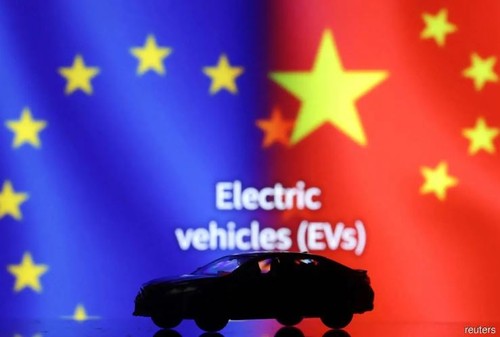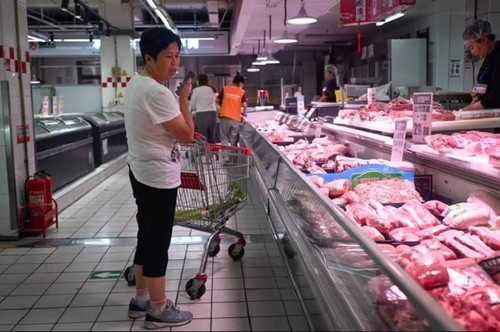 The EU intends to increase tariffs from 17.4 to 38.11% on imports of Chinese EVs. (Photo: Reuters) The EU intends to increase tariffs from 17.4 to 38.11% on imports of Chinese EVs. (Photo: Reuters) |
China’s Ministry of Commerce said China has begun an anti-dumping investigation on pork and pig by-products from the EU, a move widely seen as a response to a recent EU action.
Escalating tensions
China’s Ministry of Commerce made its announcement five days after the European Commission announced on June 12 that it intends to impose tariffs of up to 38% (10% higher than the current rate) on imports of Chinese electric vehicles, after an investigation concluded that Chinese EV manufacturers are receiving big subsidies from the State. The EU set a deadline of July 4 to apply the new import tariffs ranging from 17.4% to 38.1% on Chinese EVs and says it’s ready to consider further evidence of complaints from China. Some observers say the EU’s higher tariffs on Chinese EVs were unavoidable.
China's Ministry of Commerce has repeatedly said China will act resolutely to protect the interests of its businesses. In January, China opened an investigation into French brandy after the EC began an investigation into Chinese electric vehicles, photovoltaic panels, and medical equipment. Agriculture is the sector where Europe faces the greatest risk of retaliation. Luxury goods, such as wine, chocolate, high-end furniture, and luxury cars may also be targeted.
Jens Eskelund, President of the European Chamber of Commerce in China, warned that if this happens, the EU and China, two trading superpowers, could find themselves in a large-scale trade war which will damage both sides.
Simon Schutz, a spokesman for the German Automotive Industry Association, said: “The German automobile industry is not in favor of these tariffs because it doesn’t believe tariffs are a good way to resolve trade conflicts. If we decide to impose these tariffs, it might be the start of a trade war. And one thing is clear: trade wars only produce losers on both sides. There’s never a winner in a trade war.”
Paul Triolo, an analyst with the Albright Stonebridge Group, said neither the EU nor China wants a large-scale trade conflict right now. He said the EU's decision to apply tariffs on Chinese electric vehicles temporarily (for four months starting July 4 – if negotiations fail) means Europe wants to leave a way back.
“The danger is getting into sort of a tit-for-tat tariff battle here. Nobody seems to want this. The Commission may show some flexibility, as they did in making this decision,” said Triolo.
 A woman shops in a supermarket in China. (Photo: AFP) A woman shops in a supermarket in China. (Photo: AFP) |
Future of European electric vehicles
Although most analysts believe neither the EU nor China wants a trade war, the EC's higher tariffs on China’s electric vehicles will have a major impact. EVs are a strategic priority in the EU's Green Pact. After 2035 the EU will ban the sale of new combustion engine cars. If tariffs on China’s EVs increase, European consumers will have to pay more for EVs, which will slow the transition from combustion to electric cars and undercut the EU's strategic goal of carbon neutrality by 2050.
Volkswagen released a statement last week saying that the EC's decision to raise tariffs on Chinese EVs is an act of protectionism, the negative effects of which will outweigh any potential benefit.
Joe Mazur, an analyst with the Trivium China Group, said Europe can hardly hope to use tariffs to block the flow of Chinese electric vehicles. “The EU’s tariffs are within prediction. Although there will be impacts but it's by no means a death blow to the Chinese EV industry in Europe. Chinese EVs makers have offered very competitive prices in recent years. With the new tariffs, they would have to cut profit margins or be forced to pass along some of the cost increases to consumers.”
Calculations by the economic research and analysis group Rhodium show that five out of six car models of BYD, China's largest electric vehicle manufacturer, would still be profitable in Europe even with a 30% tariff, but Tesla’s Model 3, which is also manufactured in China, would no longer be profitable.